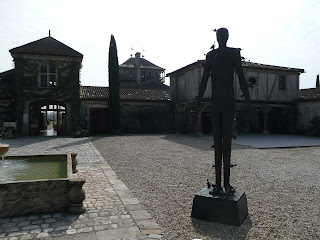Balance schmallance
The picture above is a reminder that the primeurs tastings in Bordeaux loom large (the photograph is of Château Smith-Haut-Lafitte) and I anticipate tasting a great many delicious wines in most of the region's communes, plus the usual disfunctional bunch of try-too-hards who seem largely to confine themselves to the vineyards of St Emilion and Margaux.
It is to Bordeaux that one turns these days for the majority of one's experiences of unbalanced hooch. The attempts of some wine makers to conform to the popular styles prescribed by US wine critics give rise to wines made from fruit that is picked overly late, that are flabby and drenched in oak and its associated tannin, that will never find any level of equilibrium.
I experienced such a bottle over dinner in Bordeaux a couple of years ago. We dined at the Bistro du Médoc and took along various wines, one of which was a mature St Emilion from a big-name property. And it was execrable. It tasted like a sultana with all the flesh and sweetness removed; like a mouthful of vaguely fruity dust that had somehow liquified.
Balance has long been held up as one of two characteristics (along with length) considered de rigeur for a wine to be judged fine. Except I don't really get it. Here's why -
Being a fly fisherman I have, over the years, read quite a bit of writing on the subject. The advice one so often reads for anyone thinking of buying a new fishing rod is "try before you buy", the thought being that one should check that the "action" of the rod suits one's casting style. And, to be frank, I don't understand this advice either and for much the same reason.
Buy a car and, okay, it feels a bit new and different for a while, but one soon gets used to it. One learns that the biting point of the clutch is a little higher, that the steering rack is a bit quicker etc. but one quickly acclimatises oneself to the new characteristics specific to that vehicle.
So it is with fishing rods. One casts a bit and learns how to use the thing through experience. The problem arises if one is presented with ten different rods (or, indeed, cars for that matter) and asked which one prefers. Anything that stands out as unnatural or ungainly - be that something that one would easily and quickly become used to or not - would move one to reject it.
And this is my thing about wines and their balance. Try a new wine, gauge its characteristics and then work out how to "use" it: with food or without; super-cool or rather warmer; for grand occasions (and I can think of plenty of cheaper wines that would fit this bill), or for drinking with mates and largely without thought in front of a Six Nations game.
Outside of Bordeaux I taste very, very few properly unbalanced wines these days. And wines that might seem so when sampled in a line-up of unrelated bottles turn out to be ideal for consuming in specific circumstances. In any event, what is considered perfect balance in the tasting room (or even in the wine cellar for that matter) is rarely the right balance for the situation in which the wine will be enjoyed.
It's my opinion that we obsess overly about balance. Now don't get me started on length...


